Originally posted at: http://www.nerdfitness.com/

You’re here because you want to calculate your protein requirements!
Well my friend, you’ve arrived at the right place.
We built a protein calculator to help our Online Coaching clients and I’m excited to share it with you today too!
Here’s what we’ll cover:
- The Nerd Fitness Protein Calculator
- How much protein should I eat in a day?
- How much protein should I eat to build muscle?
- How much protein should I eat to lose weight?
- Can I eat too much protein?
- How to get enough protein (Next steps)
You look like you’re in a hurry, so let’s jump right in!
The Nerd Fitness Protein Calculator
On the Metric System? Click here.
Boom!
You now have a range for the amount of protein you need in a day!
I know…we just threw a lot at you.

Let’s explain some of these numbers and equations in case you want to nerd out on the details.
How Much Protein Should I Eat in a Day?

As we cover in our guide How Much Protein Do I Need to Eat, you’re going to find all sorts of different recommendations for how much protein you should be consuming.
For example, the current international Recommended Dietary Allowance (RDA) for protein is 0.4g per pound of bodyweight (0.8 g per kg of body weight).[1]
Case closed?
Nope.

In our opinion, and as pointed out by this study[2] the RDA for protein is too low and should be higher regardless of your body composition.
Our calculator actually starts you off at 0.54–0.82g per pound of bodyweight (1.2–1.8 g/kg), which tops out at over twice the level of the RDA.[3]
Another criticism of the RDA recommendation: the amount of protein you should eat is really going to be dependent on you and your goals. That’s why we had so many variables in our calculator above.
The RDA’s blanket recommendation for protein intake is oversimplified.
We’ll dive into this more with our next two sections.
One last piece of general advice: we gave you protein intake ranges from low to high. That’s because you as an individual may react to certain levels of protein differently.
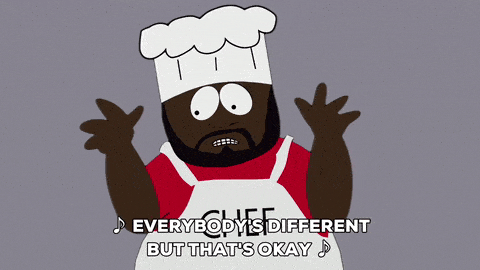
So don’t take our protein recommendation as gospel!
Consider your results here as a starting point. Try one range, see how you feel, and take it up or down from there.
If you seem to do better on a certain amount of protein, don’t worry if it’s not within our range.
The protein recommendations here come from studies, and studies are based on averages. You may be an outlier, which 100% happens.
Use the results of our protein calculator as a starting point and see how you feel. This is advice we give every coaching client when we discuss protein with them.
How Much Protein Should I Eat to Build Muscle?

If you’re trying to build muscle, you’re going to want to eat enough protein to induce muscle repair and growth.
After all, protein is the building blocks of muscle tissue, so you’ll need plenty if you’re looking to bulk up or just build muscle.
How much?
If you’re of healthy weight, active, and wish to build muscle, aim for 0.64–1.09 g/lb (1.4–2.4 g/kg).[4]
There is some evidence that a higher range might be beneficial. Not so much in gaining more muscle, but to minimize fat gain during a bulking phase.[5]
As we mention in our guide, 12 Tips to Gain Weight Quickly, you might put on a little fat when eating in a caloric surplus to grow muscle.
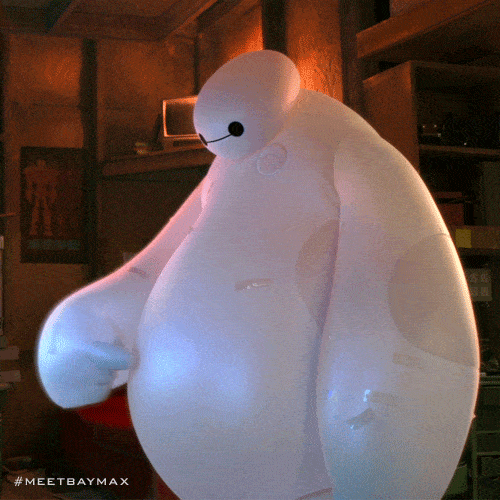
More protein may counteract this a little.[6]
If you’re an experienced lifter on a bulk, intakes up to 1.50 g/lb (3.3 g/kg) may help you minimize fat gain.
Now of course, if you want to grow muscle, you can’t just eat protein…you also need to strength train!
Luckily, you’re in the right place for that.
Here are some resources to begin your training:
- 5 Best Strength Training Workout Routines For Beginners. If you don’t know where to start your strength training journey, start here. This guide will walk you through bodyweight exercises onto becoming a full gym warrior (here’s how to build a home gym if you’re avoiding public facilities).
- The Beginner Bodyweight Workout. If you’re looking for an exercise routine that can be done ANYWHERE, look no further. Our beginner routine has jumpstarted many Rebels in their strength training. You’d be surprised how much muscle you can build with your own weight, a milk jug, and a sturdy table.
- Build Your Own Workout Routine. After you do a workout or two, it’s time to strategize. What should you train and on what days? When should you rest? Our guide will walk you through building a complete routine.
Another option is to check out our Online Coaches Program, where a trained expert can build you a customized workout, then adjust it each month based on your progress:
How Much Protein Should I Eat to Lose Weight?

If you’re looking to lose weight, eating plenty of protein will be an important part of the equation.
Why is protein important for weight loss?
Think of it this way: protein is the only macronutrient you don’t store.[7]
Carbs are stored as muscle glycogen and blood glucose. Fat is stored as body fat. If your body needs either, it can look to its held reserves for resources.
Not so for protein.
Meaning most of the protein in your body is currently doing a job: building muscle tissue, making enzymes, strengthening bones, etc.
If you don’t eat enough protein, your body will turn towards your muscles for its needs.
So if you’re not careful when you’re losing weight, you could lose muscle AND fat.
Obviously, from a health and physique standpoint, this is not good.

That’s why you need to eat plenty of protein and strength train during periods of weight loss, so most of the weight you’ll lose will be fat while retaining the muscle you have.
This is something we cover extensively in Can I Lose Fat and Gain Muscle at the Same Time?
(Spoiler alert: you can with the right plan.)
If you’re just starting your weight-loss mission, we can help!
Here are some resources to get you going:
- The 5 Rules of Weight Loss. If you’ve ever been on a diet, or are currently on a diet, give this a read. Here we discuss why people succeed with popular dieting programs and why they don’t, plus actionable steps you can take to achieve sustainable weight loss.
- Start Eating Healthy Without Being Miserable. If you’re confused about healthy eating (“Should I nix carbs? Do I have to count calories?”), start here. We’ll explain how to consistently build healthy meals while still eating the foods you love. Nobody should be forced to give up pizza forever.
- How Many Calories Should I Eat Every Day? We’re not going to make you count calories for the rest of your life. However, we do want you to have some awareness of the number of calories you are eating. We’ll give you a caloric range to shoot for, plus some tips on how to portion control.
You can also download a Free 10 Level Diet Guide too when you join the Rebellion and sign up in the box below:
- Follow our 10-level nutrition system at your own pace
- What you need to know about weight loss and healthy eating
- 3 Simple rules we follow every day to stay on target
Can I Eat Too Much Protein?

Now that I’ve drilled into your head that should be consuming plenty of protein, a natural question will arise:
How much protein is too much protein?
The good news here is that as long as you have healthy kidneys, you can eat a lot of protein with no ill effects.
As Examine points out in its research on protein:[8]
“Higher protein intakes seem to have no negative effects in healthy people,”**
**Of course, if you have specific kidney or medical issues with regards to protein intake, PLEASE go with your doctor’s recommendation for required protein consumption!
Go ahead and aim for the high end from our protein calculator.
One thing: if our current recommendation for protein is a lot higher than what you normally do, ease into it.

Don’t go from minimal protein intake, to then woofing down steak and eggs while chugging a protein shake.[9]
Studies have found that immediately doubling protein intake can be harsh on the body.[10]
Make it a gradual process (a little more daily, week after week) and you’ll be fine.
How to Get Enough Protein (Next Steps)
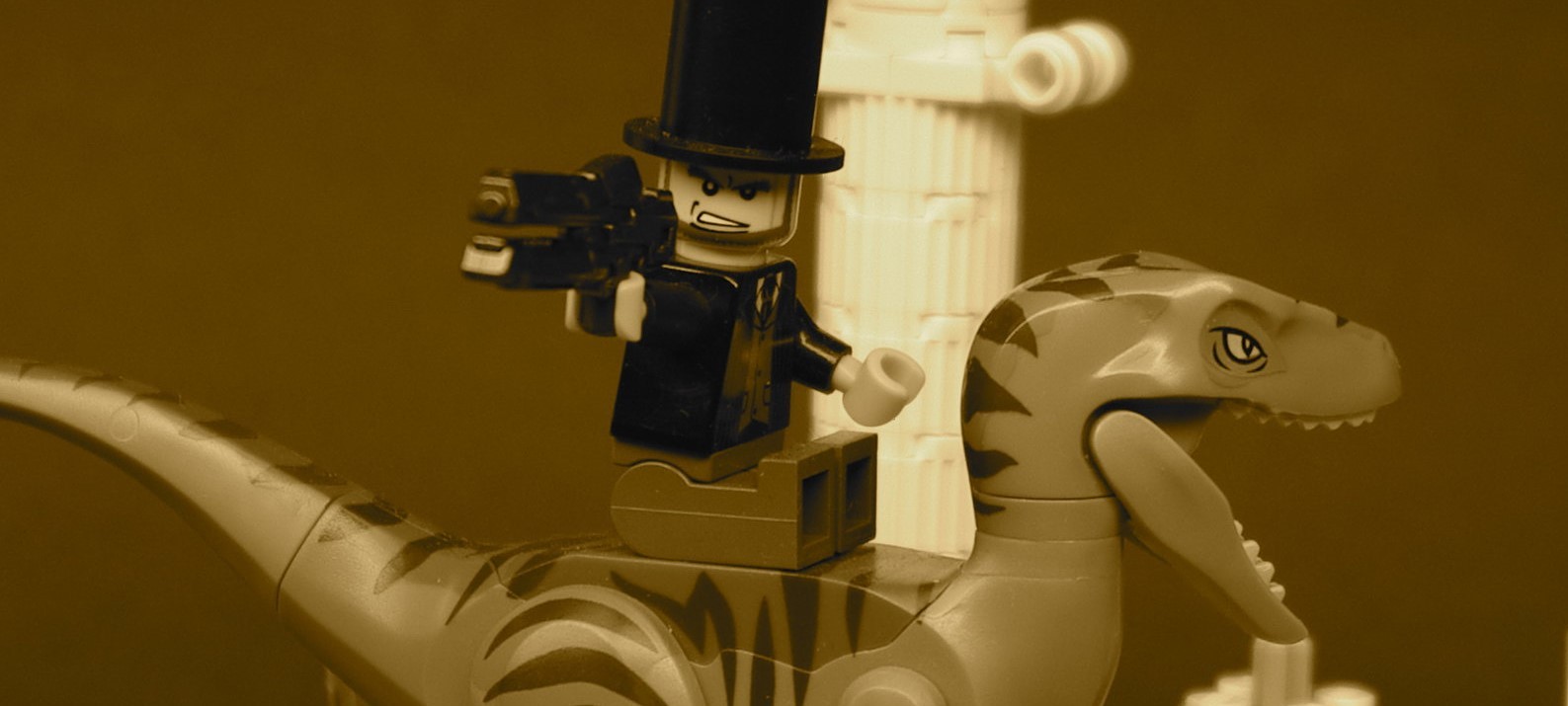
Now that you have an estimate of the amount of protein you need, the last question to answer is: how do I eat all this protein?
Our number #1 recommendation is to get protein from whole foods. This will have most of the nutrients intake.
A serving of protein is about the size and thickness of your palm:
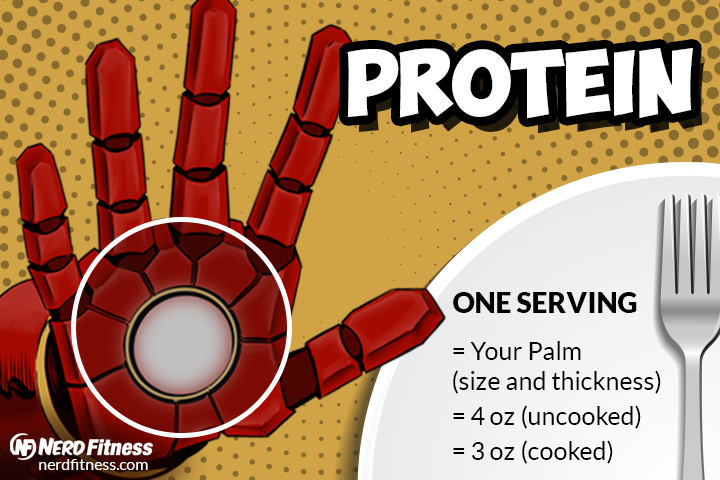
Protein can come from any number of sources, including:
- Meat (steak, bison, pork).
- Fowl (chicken, turkey, duck).
- Eggs[11]
- Fish and shellfish (salmon, tuna, shrimp).
- Legumes (black beans, chickpeas).
Not a meat-eater? Read our massive plant-based guide!
However, if you’re aiming for the higher ranges of protein intake, or you’re on a serious bulk, you might need to supplement.
Personally, I drink a protein shake daily to help me reach my goals.

Some protein supplements to consider:
- Whey protein powder, a milk byproduct that is widely used.[12]
- Egg protein powders, that is made from…eggs!
- Pea protein powder, a popular supplement in the plant-based community.
Check out The Ultimate Protein Shake Guide for more protein powder recommendations and recipes on how to make delicious smoothies.
Whether through whole foods or supplements, protein should be a main part of every meal you eat. It’s one of our top recommendations for being a healthy nerd.
Calculate your protein needs, determine the proper portion sizes to reach your target, and see how you feel!
You can always adjust up or down based on your results.

If you need any help along the way, we got you.
Here are three ways to continue your journey with Nerd Fitness.
#1) Our Online Coaching program: a coaching program for busy people to help them make better food choices, stay accountable, and get healthier, permanently.
As I said before, we teach portion control to our clients who struggle with overeating, so we’ll provide a non-judgmental expert to help you reach your goals.
You can schedule a free call with our team so we can get to know you and see if our coaching program is right for you:
#2) Exercising at home and need a plan to follow? Have questions you need answered? Join Nerd Fitness Prime!
Nerd Fitness Prime is our premium membership program that contains live-streamed workouts with NF Coaches, a supportive online community (with many like-minded people dealing with “portion control”), group challenges, and much more!
Option #3) Join the Rebellion! We need good people like you in our community, the Nerd Fitness Rebellion.
Sign up in the box below to enlist and get our Rebel Starter Kit, which includes all of our “work out at home” guides, the Nerd Fitness Diet Cheat Sheet, and much more!
- The 15 mistakes you don’t want to make.
- Full guide to the most effective diet and why it works.
- Complete and track your first workout today, no gym required.
Alright, I want to hear from you:
Did you calculate your protein requirements?
Do you generally consume around this target?
Have any tips or tricks for getting enough protein?
Let us know in the comments!
-Steve
PS: Check out the rest of our protein series:
###
Photo source: When Dinosaurs ruled the Earth, Bruce “green” Banner, Who wants a hot dog?, Morning run with the Fitbit, Sneaky Raptor, This one’s for you, Robert E. Lee!,
- Read, “Protein for Life: Review of Optimal Protein Intake, Sustainable Dietary Sources and the Effect on Appetite in Ageing Adults.” Source, PubMed.
- Read, “Evidence That Protein Requirements Have Been Significantly Underestimated.” Source, PubMed.
- Our friends at Examine put out one of the most well researched and comprehensive looks at dietary protein, and our calculator matches their recommendation.
- Read, “The Effects of Consuming a High Protein Diet (4.4 g/kg/d) on Body Composition in Resistance-Trained Individuals.” Source, PubMed.
- Read, “A High Protein Diet (3.4 g/kg/d) Combined With a Heavy Resistance Training Program Improves Body Composition in Healthy Trained Men and Women–A Follow-Up Investigation.” Source, PubMed.
- Read, “The Effects of Overfeeding on Body Composition: The Role of Macronutrient Composition – A Narrative Review.” Source, PubMed.
- Read, “Optimal Intakes of Protein in the Human Diet.” Source, PubMed.
- Examine: Can too much protein be bad for you?
- Read, “Controlled Changes in Chronic Dietary Protein Intake Do Not Change Glomerular Filtration Rate.” Source, PubMed.
- Read, “Effect of Short-Term High-Protein Compared With Normal-Protein Diets on Renal Hemodynamics and Associated Variables in Healthy Young Men.” Source, PubMed.
- Dietary cholesterol doesn’t influence blood cholesterol levels as much as conventional wisdom once thought. Go ahead and eat eggs!
- Check out this review from the Austin Journal of Nutrition and Review.
Filed under: Fitness

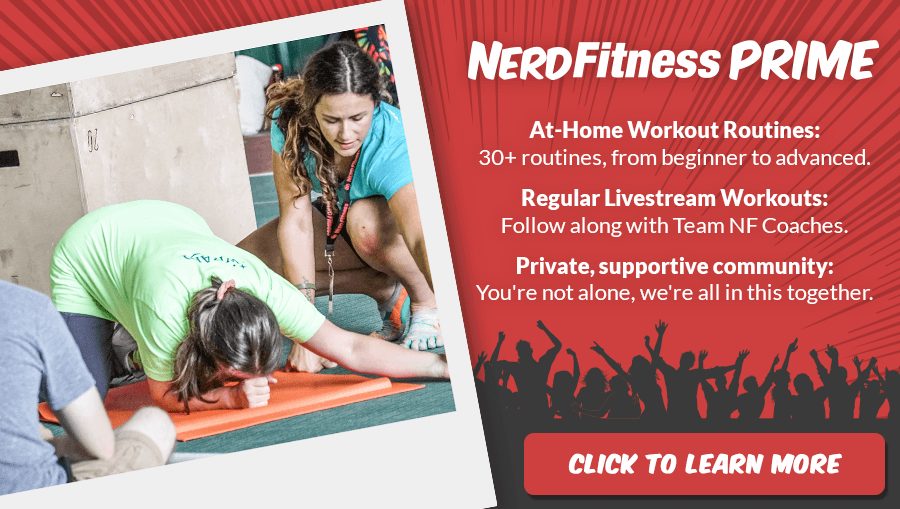
 For now classes are 6pm and 640pm at 2840 Wildwood st in the Boise Cloggers studio.
Book your class NOW!
click this ==>
For now classes are 6pm and 640pm at 2840 Wildwood st in the Boise Cloggers studio.
Book your class NOW!
click this ==>








